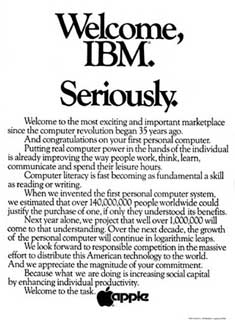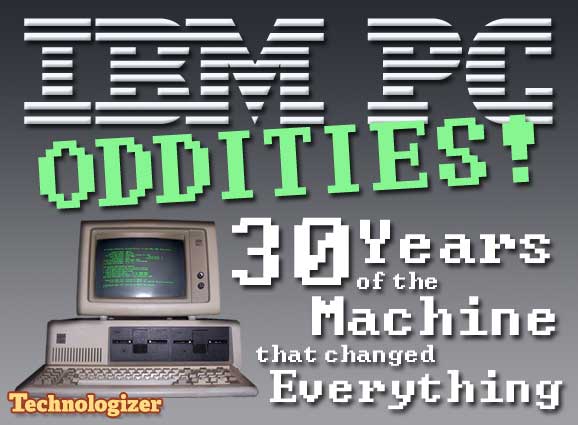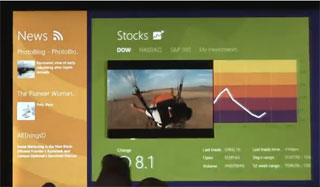Bloomberg’s Jeffrey “No Relation” McCracken, Serena Saitto, and Aaron Ricadela are reporting that HP plans to spin off its PC business and might announce so as soon as today. Big news if it happens–but not necessarily big news that would have much of a visible impact on HP customers. (Betcha that the brand name they adopt will be…HP.)
Tag Archives | PCs
A World Without the IBM PC

Apple's famous ad.
On August 12th, 1981, IBM announced its first PC. That makes today the thirtieth anniversary of the platform that’s sometimes been called the PC clone, IBM PC compatible, or Wintel…but is most often simply called the PC. We started our celebration on Thursday with Benj Edwards’ look at PC oddities such as Bill Gates’s donkey-avoidance game. But thinking about some of the weirdness that the PC inspired got me to thinking: what if IBM, which took a long time to decide to do a PC at all, had decided not to do one? What if it had decided that microcomputers were a blip and it should stick to mainframes?
The announcement of the PC was one of the most important moments in tech history, since computers based on the PC’s design quickly flooded the market and established a standard which lives on to this day in every Windows PC. As I played around with the idea of the IBM PC suddenly vanishing from the history books, I started asking myself questions, and trying to come up with answers. (Hey, the whole subject is so unknowable that there’s no such thing as a wrong answer…)
28 comments
The PC Turns 30
 On August 12th, 1981, IBM announced its first PC. I was a high school student at the time, and was totally unimpressed. The machine was boxy and boring, with graphics that couldn’t compare to something like the Atari 800. And it was way too pricey. Who’d go for that?
On August 12th, 1981, IBM announced its first PC. I was a high school student at the time, and was totally unimpressed. The machine was boxy and boring, with graphics that couldn’t compare to something like the Atari 800. And it was way too pricey. Who’d go for that?
Lots of people, it turned out–and even today, the vast majority of us use PCs directly descended from IBM’s first one. To mark one of the most important anniversaries in computing history, Benj Edwards, as is his wont, has focused in on some its sidelights and curiosities. Read about them in IBM PC Oddities.
No comments
IBM PC Oddities
 Thirty years ago this Friday, IBM announced its very first Personal Computer, the 5150. The tech press, in a rare unified act of prescience, immediately recognized a new computing standard taking shape before its eyes.
Thirty years ago this Friday, IBM announced its very first Personal Computer, the 5150. The tech press, in a rare unified act of prescience, immediately recognized a new computing standard taking shape before its eyes.
For three decades, the platform created by the IBM PC has served as the bedrock for computing progress and innovation. Most of us use still PCs that retain some compatibility with the first PC. That’s amazing.
The true tale of the IBM PC is too complex to convey with a mere historical narrative. You need to see the hidden world of back-alleys, dead-ends, and detours that is…IBM PC Oddities.
3 comments
Windows 8 in April 2012? Could Be!
 ZDnet’s Mary Jo Foley is reporting on a rumor: Microsoft may be trying to finish up work on Windows 8 by April of next year. She thinks it’s plausible–or at least not obviously crazy. Me, too. For one thing, the conventional wisdom that the OS is likely to show up for the holiday 2012 season is, as far as I know, based more on history than on anyone knowing anything specific about Windows 8. For another, Microsoft has a huge incentive to get this thing out the door–not so much for its PC business, but for tablets, where it’s not yet really in the game and won’t be until Windows 8 is available. And Steven Sinofksy, the Microsoft exec in charge of Windows, has a pretty good track record for exceeding expectations when it comes to shipping products in a timely fashion. (Enough so that I think that anyone who parrots the classic “Microsoft never gets anything out the door” meme hasn’t been paying attention over the past few years.)
ZDnet’s Mary Jo Foley is reporting on a rumor: Microsoft may be trying to finish up work on Windows 8 by April of next year. She thinks it’s plausible–or at least not obviously crazy. Me, too. For one thing, the conventional wisdom that the OS is likely to show up for the holiday 2012 season is, as far as I know, based more on history than on anyone knowing anything specific about Windows 8. For another, Microsoft has a huge incentive to get this thing out the door–not so much for its PC business, but for tablets, where it’s not yet really in the game and won’t be until Windows 8 is available. And Steven Sinofksy, the Microsoft exec in charge of Windows, has a pretty good track record for exceeding expectations when it comes to shipping products in a timely fashion. (Enough so that I think that anyone who parrots the classic “Microsoft never gets anything out the door” meme hasn’t been paying attention over the past few years.)
7 comments
“It’s Getting Awfully Lonely in PC Land”
Are consumers starting to lose interest in the PC as we know it? News about the components that go into PCs may provide clues.
No comments
Home Computing in 1966? Pretty Much Like Home Computing in 2011
This futuristic clip–supposedly produced in 1966–pretty much nails what home computers would eventually give us: online shopping, e-mail, banking, Webcams, multiple monitors, printers, self-healing Internet, and all.
(Via By Ken Levine)
7 comments
Buy a PC, Get an Xbox 360
Apple has long offered students a tempting back-to-school deal: a free iPod when you buy a Mac. Now Microsoft is offering something similar. Nope, not a free Zune–a free Xbox 460 360 (a $200 value) when you buy a PC that sells for $699 or above at a variety of brick-and-mortar and online merchants.
4 comments
$25 Computer Aims To Teach Computing
 A British game developer has turned his efforts away from video games for a moment, and is focusing on bringing computer science education into schools. Frontier Developments founder David Braben has introduced the Raspberry Pi, a $25 Linux-based computer.
A British game developer has turned his efforts away from video games for a moment, and is focusing on bringing computer science education into schools. Frontier Developments founder David Braben has introduced the Raspberry Pi, a $25 Linux-based computer.
The computer is not much larger than a USB keychain dongle, and includes an HDMI port to connect a display, and a USB 2.0 port to connect peripherals. The device runs on Linux, thus keeping any software licensing costs low (if not non-existent).
8 comments
Apple Updates iMacs With Thunderbolt, HD FaceTime
 Apple has updated its iMac line of desktops, adding in Thunderbolt support, new quad-core chips, and an HD-ready built in camera. The moves indicate that while consumers as a whole seem to be moving to portables, the Cupertino company itself still is committed to its iconic desktop line.
Apple has updated its iMac line of desktops, adding in Thunderbolt support, new quad-core chips, and an HD-ready built in camera. The moves indicate that while consumers as a whole seem to be moving to portables, the Cupertino company itself still is committed to its iconic desktop line.
Pricing will remain the same for the base model at $1,199. It claims the iMac is the first desktop with Thunderbolt support, and the 21.5-inch model includes one port and the 27-inch model two. Engadget put this to the test, showing off two 30-inch displays being powered off these ports in a video posted to its side. Pretty darn cool.
The HD camera now will support high-definition FaceTime calls between other capable iMacs, and standard definition calls with all other enabled devices. The iMac now comes with the option to order the Magic Mouse or Magic Trackpad at no extra cost. If for some reason you still want the old wired version, you can get that too.
Another new option is the solid state drive on both models. The desktop would also include the traditional hard drive, however Apple would install the operating system on the faster flash-based SSD.
Will you be picking up one of these nice shiny new iMacs?
